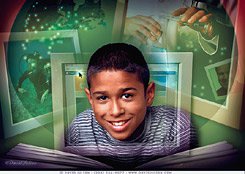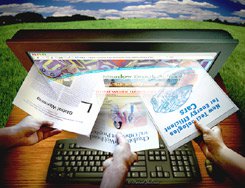The Internet Breaks School Walls Down
What happens to time-worn concepts of classrooms and teaching when we can now go online and learn anything, anywhere, anytime?

At some point last year, the Web welcomed its one billionth user. Demographers who study such things determined that this person was in all likelihood a twenty-four-year-old woman from Shanghai. As far as I know, no prizes were awarded.
The striking thing to me about that milestone is not the enormity of the number, however. More interesting, perhaps, is that the one billionth person to jump onto the Web could just as easily been an eight-year-old kid from Sweden or the South Bronx (or, for that matter, an eighty-year-old from South Africa) who sat down at a computer, opened a browser, and for the first time started connecting to the sum of human knowledge we are collectively building online. Furthermore, that eight-year-old had just as much ability to start contributing what she might know about horses or her hometown or whatever her passions might be, becoming an author in her own right, teaching the rest of us what she knows.
It's amazing in many ways that in just a few short years, we have gone from a Web that was primarily "read only" to one where creating content is almost as easy as consuming it. One where writing and publishing in the forms of blogs and wikis and podcasts and many other such tools is available to everyone. One where we can connect not just to content but to people and ideas and conversations as well.
This Read/Write Web, or Web 2.0, as some call it, is transforming the traditional structures of many of our most important institutions. How does business change when markets become lively conversations between the consumers who buy their products? What happens to politics when potentially every voter can give immediately direct feedback to elected representatives on important issues, or to journalism when anyone with a wireless camera phone can report on events both large and small? What happens to cultures when bloggers in Beirut and Haifa can connect while bombs fall around them?
And what happens to traditional concepts of classrooms and teaching when we can now learn anything, anywhere, anytime?
I find these questions particularly intriguing because my own learning and teaching have been transformed since I stumbled across a blog in spring 2001. I became a blogger that same day, and I've been writing and thinking and learning at Weblogg-ed.com ever since. That is where my passion for these technologies and their effects on teachers and classrooms is chronicled and archived.
Some 2,500 pieces of published writing later (with almost as many comments back from readers), I can say without hesitation that all my traditional educational experiences combined, everything from grade school to grad school, have not taught me as much about learning and being a learner as blogging has. My ability to easily consume other people's ideas, share my own in return, and communicate with other educators around the world has led me to dozens of smart, passionate teachers from whom I learn every day. It's also led me to technologies and techniques that leverage this newfound network in ways that look nothing like what's happening in traditional classrooms.
In this new interactive Web world, I have become a nomadic learner; I graze on knowledge. I find what I need when I need it. There is no linear curriculum to my learning, no formal structure other than the tools I use to connect to the people and sources that point me to what I need to know and learn, the same tools I use to then give back what I have discovered. I have become, at long last, that lifelong learner my teachers always hoped I would become. Unfortunately, it's about thirty years too late for them to see it.
The good news for all of us is that today, anyone can become a lifelong learner. (Yes, even you.) These technologies are user friendly in a way that technologies have not been in the past. You can be up and blogging in minutes, editing wikis in seconds, making podcasts in, well, less time than you'd think. It's not difficult at all to be an active contributor in this society of authorship we are building.
As usual, many of our students already know this. Kids are flocking to the Web by the millions, enthusiastically sharing music, stories, poetry, video, and pictures (some of which we'd rather not see.) They are communicating online, IMing, gaming, participating, producing. It's like using pen and paper and a printing press in digital space, and they are pushing it, stretching their imaginations, looking to us to do the same. Looking to us, as those well-documented (though still relatively rare) problems at MySpace demonstrate, to teach them how to do it well. And we educators can feel the potential.
In an environment where it's easy to publish to the globe, it feels more and more hollow to ask students to "hand in" their homework to an audience of one. When we're faced with a flattening world where collaboration is becoming the norm, forcing students to work alone seems to miss the point. And when many of our students are already building networks far beyond our classroom walls, forming communities around their passions and their talents, it's not hard to understand why rows of desks and time-constrained schedules and standardized tests are feeling more and more limiting and ineffective.
Regardless, we find this era of the maturing of the digital natives, as Marc Prensky calls them, to be a troublesome time. These technologies scare us, challenge us, and the friction between the old, closed-door classrooms and this new, open, transparent world of learning is becoming more and more apparent. Being on the Web changes things. We fear for our kids' safety, and, as educators, we struggle mightily with the way we're losing control over the content we used to own.
It feels as if the ground is shifting beneath us, and it's made us uneasy.
So our response to this new learning landscape has not been universal joy and a rush to blogging and podcasting. In many schools and even states, it's been, rather, a movement to block and bust: no blogs, no cell phones, no IM. We take away the powerful social technologies our kids are already using to learn and, in doing so, tell them their own tools are irrelevant. Or, instead of using the complex and challenging phenomenon of a site such as Wikipedia to teach the realities of navigating information in this new world, we prohibit its use. In fact, at this writing, the U.S. legislature is in the process of deciding whether schools and libraries should have access to any of the potential of the Read/Write Web at all. When you read this, blogs and wikis and podcasts (and much more) may be things that students (and teachers) can access and create only from off-campus.

And so they might never learn to podcast like the third and fourth graders creating the podcasts in Bob Sprankle's class at Wells Elementary School, in Wells, Maine. They might therefore never publish a local museum tour, an interview with a local celebrity, or an oral history about their town that a billion people could listen to. Nor will they ever get the chance to collaborate in a blog with U.S. soldiers in Iraq, like April Chamberlain's students at Paine Intermediate School, in Trussville, Alabama, and learn firsthand what it's like to be a Screaming Eagle. Or share stories about the places they live at Wikiville.org.uk, where hundreds of kids from around the world have started writing and connecting. Or teach calculus to thousands of interested readers from around the world, as do the Canadian students in Darren Kuropatwa's math class at Daniel McIntyre Collegiate Institute, in Winnipeg, Manitoba.
Nor will they fully understand what it's like to be a ubiquitous, continuous learner in a quickly changing world of information that is challenging many of the traditional structures of education. Like me, they may just have to figure that out for themselves.
Most of us now live in a world where, with access, knowledge is abundant, yet we have yet to reconsider our traditional school model, which is based on the obsolete idea that knowledge is scarce. Take a look at the more than 1,400 courses available at MIT OpenCourseWare (see the Edutopia article, "Crack the Books: Teacher, This Book's For You"), which seeks to "provide free, searchable, access to MIT's course materials for educators, students, and self-learners around the world." It's an amazing array of syllabi, readings, even video lectures from professors that is out there for any of us to tap into, free of charge. It's just one of millions of places where we can learn on the Web, yet most of our students still expect "real" learning to take place only in a classroom.
This is a world where we can easily make connections to ideas and people and build potent learning networks in the process, one where leveraging these networks and tools can yield a powerful online portfolio of ideas and artifacts. Yet we teach in classrooms limited by physical walls, contrived relationships, and mind-numbing assessments. There are a billion primary sources out there -- scientists, journalists, politicians, and the like -- who may know more than we do about whatever it is we are teaching, and, for the first time, we can easily and flexibly bring them to our students to interact and learn. I was a journalism major in college, but when Pulitzer Prize-winning reporter Scott Higham, from the Washington Post, mentored one of my students by interacting with her on her blog, she learned more than I alone could have taught her. Even better, we can teach our students how to make these connections themselves, to find the sources and resources they need when they need them, instead of depending on us to provide them.
This is a world where literacy is changing, where readers need to be editors. Now that anyone can publish just about anything in a heartbeat, checking for facts and relevance often occurs after publication. If you don't believe that, go to Martin Luther-King.org, which comes up in the top ten Google search results for King yet is published by a white-supremacist group and is intended solely to discredit his work through duplicity and falsehoods. (See the Edutopia article, "Online, on Alert: Teaching Students How to Interpret the Web.") If our students don't know how to find that out, if we ourselves don't know how to do that, I would argue that we are illiterate. Yet our curricula include little if anything that goes beyond the basic reading, writing, and computational literacies.
This is, indeed, a changed world. From the realities of war to the fears of avian flu and the global-warming crisis, these first few years of the twenty-first century have already tested us in innumerable ways, and the tests show no sign of abating in either intensity or frequency. But I wonder whether, twenty-five or fifty years from now, when four or five billion people are connecting online, the real story of these times won't be the more global tests and transformations these technologies offered. How, as educators and learners, did we respond? Did we embrace the potentials of a connected, collaborative world and put our creative imaginations to work to reenvision our classrooms? Did we use these new tools to develop passionate, fearless, lifelong learners? Did we ourselves become those learners?
Or did we cling to old ideas, old models, and old habits and drift more fully into irrelevance in our students' eyes?